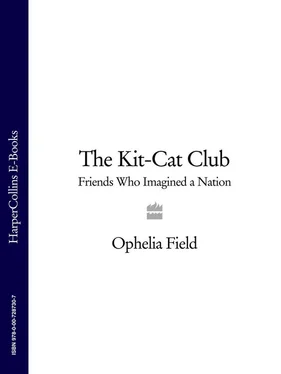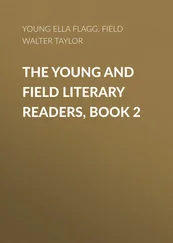For Montagu, as for Prior and Stepney, nostalgia for the collegiality of Westminster and Cambridge was a significant motive in their clubbing. These men treasured memories of sharing the life of the mind, before the realities of the world had separated them. To their eighteenth-century minds, family was directly associated with nature, in contrast to friendship, which they associated with the power of reason to make discerning, civilized choices. Montagu, at least, sought a place where his intellectually noble friendships with Prior and Stepney might be preserved, despite all that had changed in their relative circumstances since Cambridge. He also sought to extend his reputation as a patron by supporting other authors beyond his childhood friends. The Old Batchelor , for example, had won Congreve Montagu's patronage and friendship—something that may have aroused some jealousy from Prior and Stepney, since Prior once complimented Stepney's poetry by comparing it favourably to Congreve's weaker efforts. 29
For the Whig government ministers, furthermore, solidifying friendships through new clubs and associations was part of a wider civic duty to resolidify the nation. Civil turmoil had meant not knowing who your friends were from one day to the next; post-Revolutionary peace and prosperity now required rebuilding trust between like-minded men. When Dorset or Montagu was flattered as a modern Maecenas, it was not simply because they were each generous literary patrons, but because their aims resembled those of the Roman governor who, via his literary circle, had tried to reconcile a fractured society and forge ideals of ‘Roman-ness’ in the decades following a civil war.
Over the years, many observers would complain that the Kit-Cat Club monopolized literary patronage. One imagined Tonson boasting:
I am the Touchstone of all Modern Wit,
Without my Stamp in vain your Poets write.
Those only purchase ever-living Fame,
That in my Miscellany plant their Name. 30
Another saw the Club's monopoly of literary fame as a corruption of literary justice: ‘But Mastiff Poets oft are doomed to Starve, / Whilst Lapdog Wits are hugged, who less deserve.’ 31 Cognoscenti have been envied in every age, but the Kit-Cat Club's networking was more acutely resented because it was unapologetically partisan. The Whigs recognized, years before the Tories, the benefits of creating a ‘sympathetic climate of opinion’ through art, and set about establishing a patronage network to incubate this ‘climate’. 32 Dr Johnson called Dorset and Montagu ‘universal’ and ‘general’ patrons, meaning they rewarded writers of either party, but the majority of their largesse was dispensed within their own political fold. 33 They did not regard the exclusion of Tory writers from the Kit-Cat Club as a corruption of the arts by politics, since they shared a belief in ‘ amicitia ‘—a community in which political fellowship flowed naturally from virtuous characters thinking and acting in perfect accord. The Tories of the 1690s may have shared the same classical reference points, but their power base, centred on country squires and clergy, was—for the time being at least—intrinsically less ‘clubbable’ than that of the more metropolitan Whigs.
Another motive of the Kit-Cat patrons, to which Blackmore alluded in his verse account of the Club's foundation, was that ‘warlike William’ had no interest in English literature, so that authors ‘met with small Respect’ at Court and felt they must seek their rewards elsewhere. It had been, in fact, a deliberate policy on William's part to present himself as a warrior-king, too busy saving the Protestant world to bother with flattering poetic dedications. William avoided literary patronage partly in order to imply he had no need of propagandists—as a providential leader who needed no help but God's—and partly because he had little love for a language that was not his own. Hampton Court's competition with Versailles motivated royal patronage of the visual arts and architecture, but no similar royal bounty flowed towards English authors to match Louis XIV's patronage of writers such as Racine and De La Fontaine. Though the relative beneficence of previous English Courts to poets may have been exaggerated, the rising numbers of men attempting to pursue writing careers without private incomes under William III made it appear as if royal reward for wit was in short supply. This was the gap the Kit-Cats felt it their patriotic duty to fill. 34
The Kit-Cats' sense of patriotic duty was linked to their sense of historical continuity with previous literary clubs during what they regarded as England's last golden age: the reign of Elizabeth I. They had in mind the legendary ‘merry meetings’ of Shakespeare, Beaumont, Fletcher, Ben Jonson and others at the Mermaid tavern, or the ‘Apollo’ wits Jonson gathered around himself at the Devil tavern in Temple Bar. This latter club fascinated Richard Steele (he described taking a party up to the Devil in 1709 and finding ‘the rules of Ben's Club’ were still to be seen ‘in gold letters over the chimney’ 35 ), and Tonson once received an unsolicited poem that flattered the Kit-Cat Club by comparison to Ben Jonson's club at the Devil.
The dating of the Kit-Cat Club's foundation to the second half of the 1690s would place it in the context of a significant relaxation in attitudes to the public exchange of opinion. Sixteen ninety-five saw the second lapse of England's Licensing Act, after which there was a huge surge in the number of books, papers and pamphlets flying off London's presses—especially pamphlets which debated public affairs or satirized public figures.
Authors and printers could still be prosecuted under blasphemy, obscenity and sedition laws, particularly if they expressed Jacobite views (that is, supportive of James II's restoration), but there was now a feeling that just about anyone and anything could get published. It was no coincidence that the Kit-Cat's members chose Tonson as their chairman and secretary, emphasizing this link between their Club and the power of England's comparatively unfettered printing presses.
By the 1710s, there would be some 21,000 books published in Britain—far more than in any other European country—and, by approxim ately the same date, clubbing would be seen as a quintessentially English activity, John Macky observing: ‘[A]lmost every parish hath its separate Club, where the Citizens, after the Fatigue of the Day is over in their Shops, and on the Exchange, unbend their Thoughts before they go to bed.’ 36 Freedom of commerce, association and expression went hand in hand.
The Kit-Cat Club, like many of the clubs that would follow it, had an ambivalent relationship to the birth of the new style of financial capitalism around it. On the one hand, the Club was a way to preserve the ancient loyalties and hereditary customs that its members feared the new modes of commerce might extinguish. London's worlds of politics, publishing and commerce were ruthless and unregulated, making people seek refuge in the gentler ideal of ‘clubbability’. At the same time, as Whigs who generally appreciated and exploited the benefits of credit-based commerce and urban life, its members recognized that they needed to invest in social capital as much as financial capital, and the Club was formed to assist with such investment. This meant acquiring a reputation for learning and taste, and securing well-connected friends with inside information about both stocks and politics.
This was a period of great social anxiety, as boundaries between classes became increasingly blurred and the concept of gentility increasingly uncertain. In the seventeenth century, a ‘gentleman’ had been a man entitled to bear arms and with no need to work for a living, but by the 1690s gentility was becoming a more fluid matter of education, manners and taste. Outward indicators of a genteel education, such as the great private libraries of Somers and Montagu, could be imitated by anyone with money, as when a character in one of Vanbrugh's plays mocked the way gilt-covered books were valued as interior décor by the nouveau riche. Another Vanbrugh character was a ‘fake’ peer who purchased his peerage from the Crown for £10,000. To be a Kit-Cat, in this context, was to wear a badge of cultural honour that could not be faked or debased by imitation. For the first time, membership of a particular club became a recognized social credential.
Читать дальше












